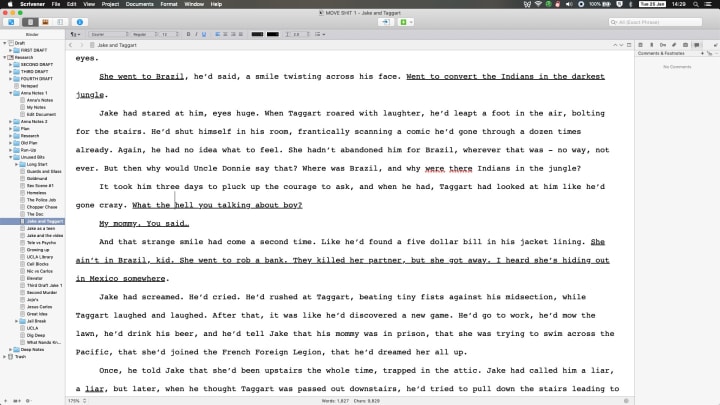5 Writing Hacks I Use Every Day
HACK THE PLANET!!!

Writing fiction, when you get down to it, is a remarkably simple job. You sit in front of a computer or smartphone, and you transfer what you see in your head onto the page. That in itself can be tortuous and tedious and bewildering, but it’s not especially complicated. It’s a bit like Tetris: easy to understand, bloody impossible to master.
But that doesn’t mean there aren’t ways to make your life easier, as a writer. Writing hacks are a gigantic business, and probably the very first thing that any new writer searches for. Because there must be a way to make getting this damn novel down easier, surely?
Most of the time, I don’t really pay much attention to the hacks you find online. They’re either eyebrow-raisingly presumptuous (avoid adverbs at all costs), bloody obvious (read a lot, carry a notebook) or fucking asinine (believe in yourself!!!) But that doesn’t mean I haven’t cultivated a few things I use to make the job writing books a little easier. Here’s my top five. And by the way, these aren’t affiliate links—I earn no money if you buy any of these pieces of software or automated potato peelers (you’ll see). That's not how we roll.

1. The Right Software
You can write using anything. Laptop, smartphone, pen, pencil, Google Docs, Microsoft Word. My buddy Mike Chen has punched out several of books using his thumbs on his smartphone, which makes my joints ache just thinking about it (also, Mike's book LIGHT YEARS FROM HOME is out this week! Go check it out). But the one thing I’ve found is that having a dedicated piece of writing software does make things a little easier. This isn’t some elitist you-must-pay-a-high-entry-fee-to-participate thing; you don’t NEED this software. But books inevitably have multiple bits of ephemera associated with them (outlines, notes, rejected versions, scribbled pleas for help) and I find that having a single place to find them all makes a huge difference.
I use a program called Scrivener. It’s clunky and weird and I don’t use half its myriad functions, but it works for me. It gives me a big area to type in, lets me put two documents side by side, and most importantly, has every single document associated with a book in one handy sidebar. I couldn’t even imagine working without it now. It’s a little pricey (US$56) but it makes my life a billion times easier. There’s also other software, like Dabble, that is subscription based. Again: you don’t NEED Scrivener or Dabble or whatever. But I think they certainly help.

2. The Edit List
You know what the most important thing about writing books is? Keep moving forward. At all times. Don’t stop, don’t go back and rewrite, don’t overthink: just keep pushing. You have to finish. You can fix bad, but you cannot fix incomplete.
Early on, I found I had a tendency to go back and start editing what I’d already written before it was done. That, I knew with irritated resignation, was bullshit. So I started keeping what I can an Edit List. Literally: a list of questions, queries or comments about the draft, jotted down as they occur to me. It serves two purposes. One: it stops me from rewriting something I’ve just written, and two: when I DO start editing for real, I have a handy list of things to look at. The only thing better than a hack is hack that pulls double duty.

3. Unused Bits
Sometimes, you write something, and halfway through you go “This doesn’t work.” Most writers hammer the delete key, scourging the land of their awful prose. Not me. I plan to subject everyone to my awful prose and thereby rule the universe. Or something. To be honest, I haven’t figured the second part out yet.
But I don’t hit delete. I copy and paste, directly into a document I call Unused Bits. By the end of a draft, this is usually 8-10,000 words long: fragments that didn’t work, badly-written dialogue, sometimes whole chapters if I’ve done a mid-book course correction. It’s all there. Which means if I need to cannibalise it, refer to it, or just look at it and chuckle at what a dunderheaded imbecile—a hack, one might say—I can be sometimes, it’s right where I need it.

4. Keep Notes
This one is a bit YMMV, but I think every writer should have a space to take notes on whatever they’re working on. Mine is a document I literally call notepad, but yours can be a notebook, a Post-Its pad, a whiteboard, whatever. It’s a place to put down ideas, thoughts on the current work, recipes, pithy bon-mots, whatever. I use mine for a very particular purpose: problem solving. If I can’t figure out a plot problem, I will literally write about it. Using full sentences, asides, paragraphs, the works. That’s how my brainmeats work.
By the end of the draft, the notepad can be anywhere from 10,000 to 30,000 words. It’s a running commentary on the problems I face during a draft, and I couldn’t survive without it.

5. Freedom
This one is kind of obvious, but distractions suck. They especially suck for me because I am sometimes not in the mood to write, but I am always in the mood to check Twitter and Instagram. This habit does not make my agent and editor very happy. We live in a world that is intent on distracting us, and if you write, you have to consciously fight against that. Discipline works—deleting apps off your phone, putting a Faraday Cage over your router, moving to the woods and not emerging for two decades—but it’s a little tedious. Why not automate it? Hey, if we can automate peeling potatoes, we can sure as hell automate removing distractions.
I like Freedom, which simply will not let me access social media (or anything I specify) while I’m writing. Nope, sorry, not gonna happen. Nose to the grindstone, Ford. I use it so often that I should ask them to sponsor my books. THE FROST FILES…BROUGHT TO YOU BY THE FINE FOLKS AT FREEDOM. Maybe if I do that I’ll actually make some real money with this writing gig…
Probably not. Here! Have a fun metal cover of Dance Monkey that will absolutely not get stuck in your head for days and days:
About the Creator
Jackson Ford
Author (he/him). I write The Frost Files. Sometimes Rob Boffard. Always unfuckwittable. Major potty mouth. A SH*TLOAD OF CRAZY POWERS out now!






Comments
There are no comments for this story
Be the first to respond and start the conversation.